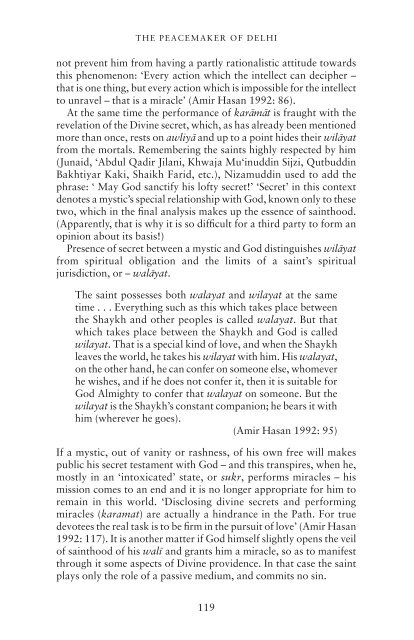Muslim Saints of South Asia: The eleventh to ... - blog blog blog
Muslim Saints of South Asia: The eleventh to ... - blog blog blog
Muslim Saints of South Asia: The eleventh to ... - blog blog blog
Create successful ePaper yourself
Turn your PDF publications into a flip-book with our unique Google optimized e-Paper software.
THE PEACEMAKER OF DELHI<br />
not prevent him from having a partly rationalistic attitude <strong>to</strong>wards<br />
this phenomenon: ‘Every action which the intellect can decipher –<br />
that is one thing, but every action which is impossible for the intellect<br />
<strong>to</strong> unravel – that is a miracle’ (Amir Hasan 1992: 86).<br />
At the same time the performance <strong>of</strong> karāmāt is fraught with the<br />
revelation <strong>of</strong> the Divine secret, which, as has already been mentioned<br />
more than once, rests on awliyā and up <strong>to</strong> a point hides their wilāyat<br />
from the mortals. Remembering the saints highly respected by him<br />
(Junaid, ‘Abdul Qadir Jilani, Khwaja Mu‘inuddin Sijzi, Qutbuddin<br />
Bakhtiyar Kaki, Shaikh Farid, etc.), Nizamuddin used <strong>to</strong> add the<br />
phrase: ‘ May God sanctify his l<strong>of</strong>ty secret!’ ‘Secret’ in this context<br />
denotes a mystic’s special relationship with God, known only <strong>to</strong> these<br />
two, which in the final analysis makes up the essence <strong>of</strong> sainthood.<br />
(Apparently, that is why it is so difficult for a third party <strong>to</strong> form an<br />
opinion about its basis!)<br />
Presence <strong>of</strong> secret between a mystic and God distinguishes wilāyat<br />
from spiritual obligation and the limits <strong>of</strong> a saint’s spiritual<br />
jurisdiction, or – walāyat.<br />
<strong>The</strong> saint possesses both walayat and wilayat at the same<br />
time ... Everything such as this which takes place between<br />
the Shaykh and other peoples is called walayat. But that<br />
which takes place between the Shaykh and God is called<br />
wilayat. That is a special kind <strong>of</strong> love, and when the Shaykh<br />
leaves the world, he takes his wilayat with him. His walayat,<br />
on the other hand, he can confer on someone else, whomever<br />
he wishes, and if he does not confer it, then it is suitable for<br />
God Almighty <strong>to</strong> confer that walayat on someone. But the<br />
wilayat is the Shaykh’s constant companion; he bears it with<br />
him (wherever he goes).<br />
(Amir Hasan 1992: 95)<br />
If a mystic, out <strong>of</strong> vanity or rashness, <strong>of</strong> his own free will makes<br />
public his secret testament with God – and this transpires, when he,<br />
mostly in an ‘in<strong>to</strong>xicated’ state, or sukr, performs miracles – his<br />
mission comes <strong>to</strong> an end and it is no longer appropriate for him <strong>to</strong><br />
remain in this world. ‘Disclosing divine secrets and performing<br />
miracles (karamat) are actually a hindrance in the Path. For true<br />
devotees the real task is <strong>to</strong> be firm in the pursuit <strong>of</strong> love’ (Amir Hasan<br />
1992: 117). It is another matter if God himself slightly opens the veil<br />
<strong>of</strong> sainthood <strong>of</strong> his walī and grants him a miracle, so as <strong>to</strong> manifest<br />
through it some aspects <strong>of</strong> Divine providence. In that case the saint<br />
plays only the role <strong>of</strong> a passive medium, and commits no sin.<br />
119


